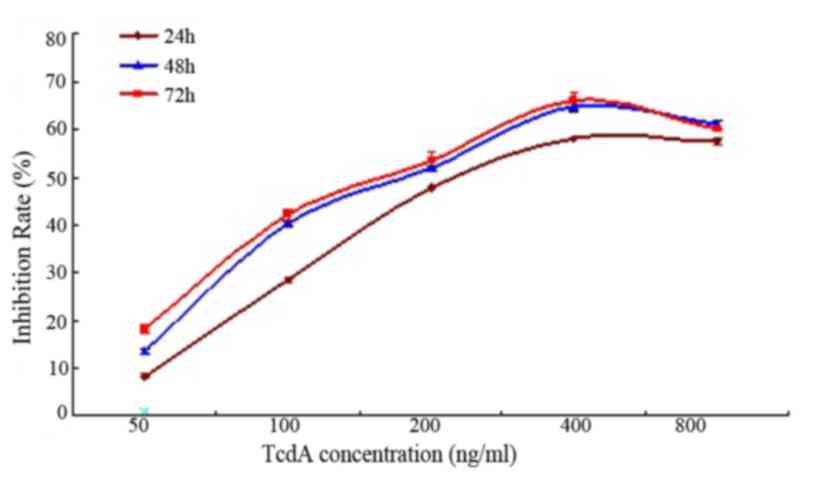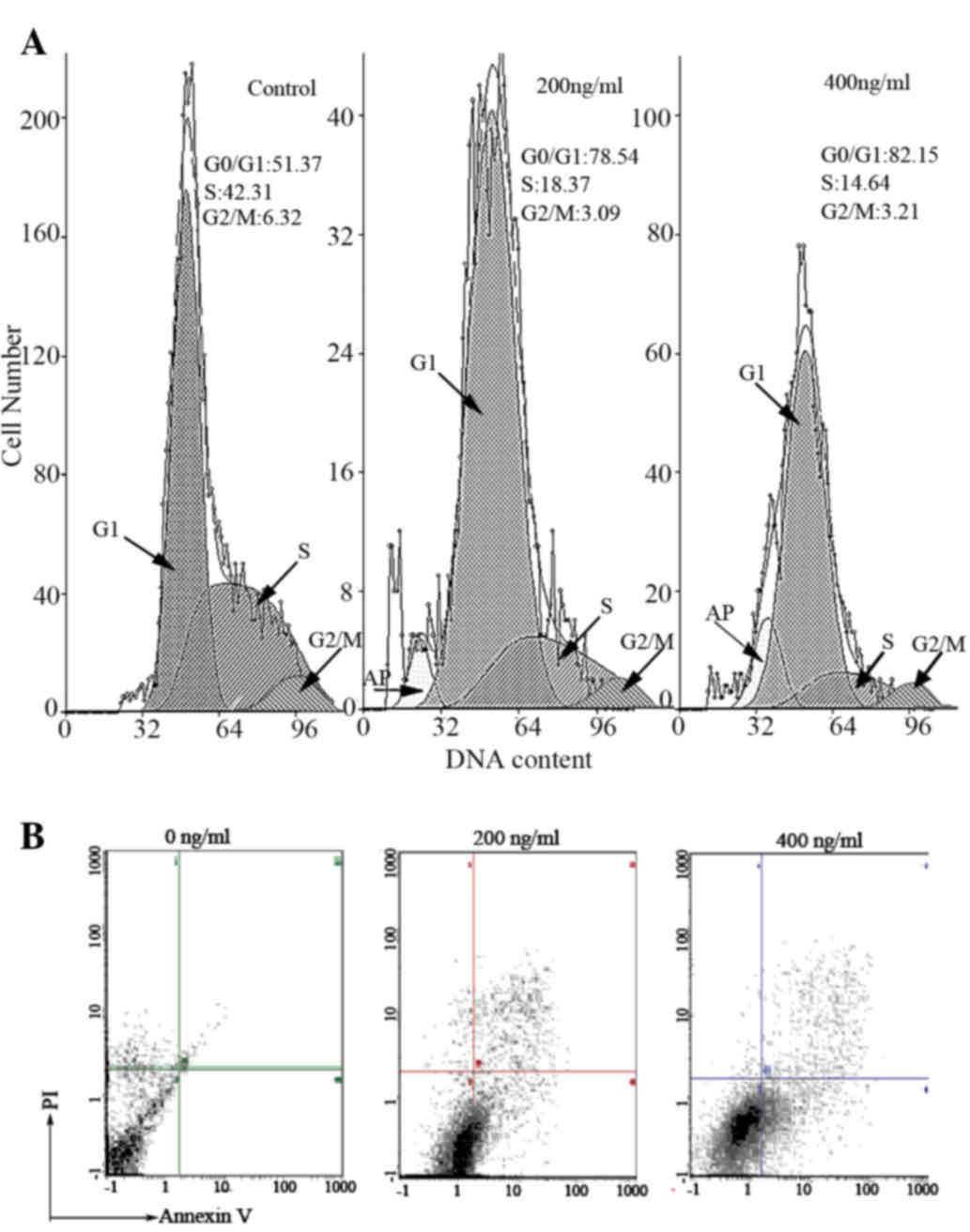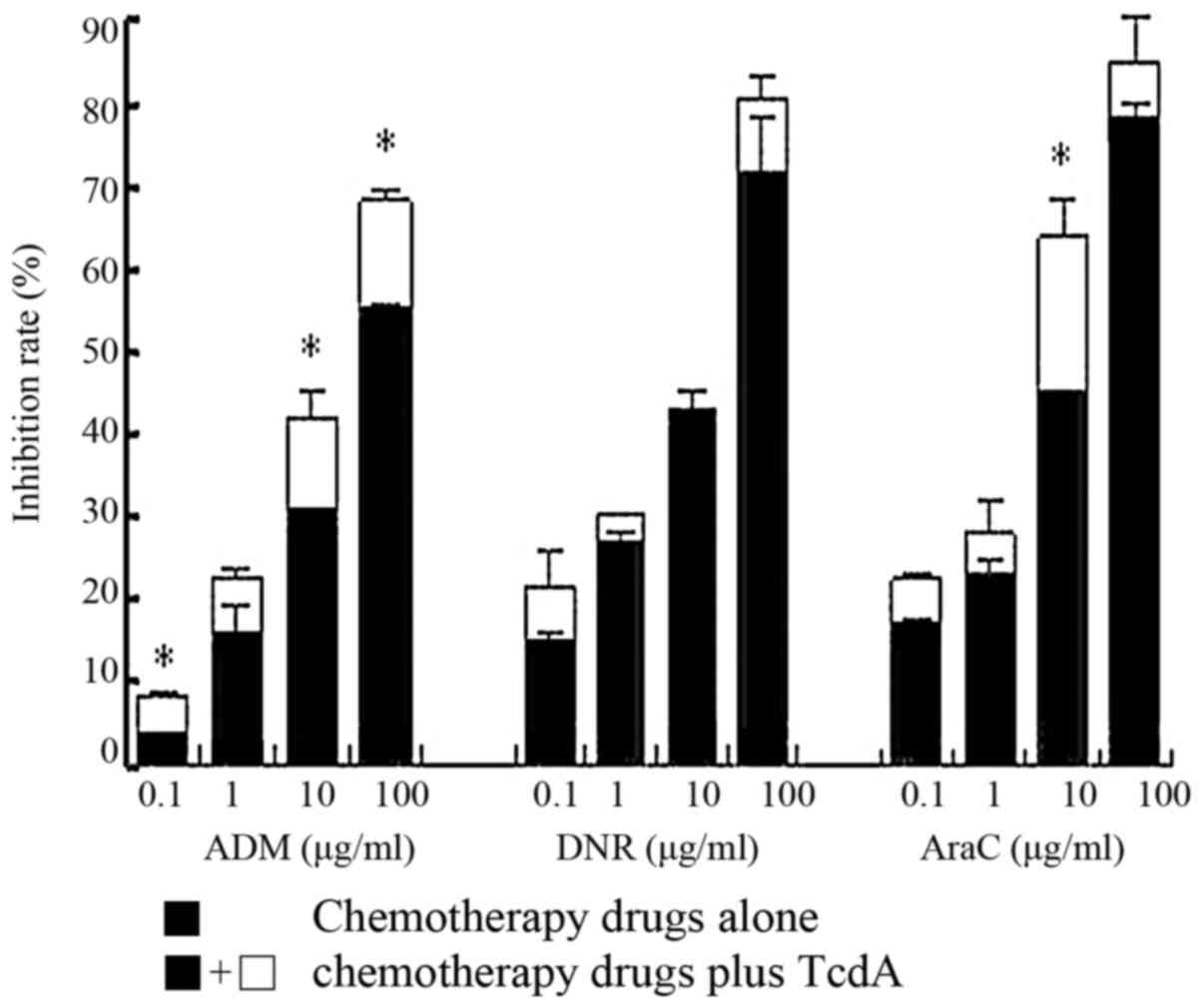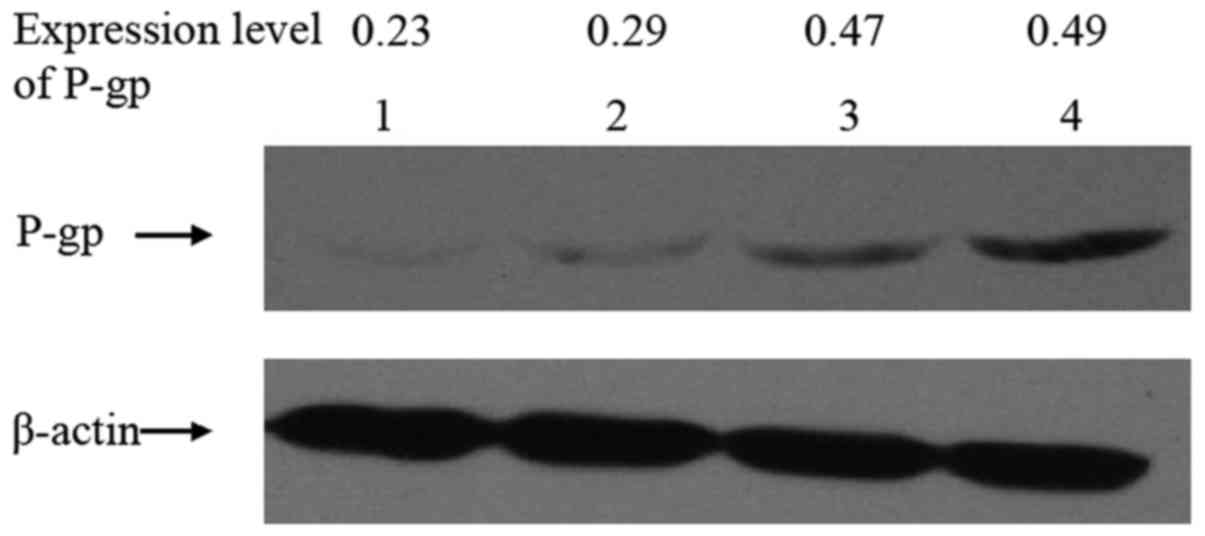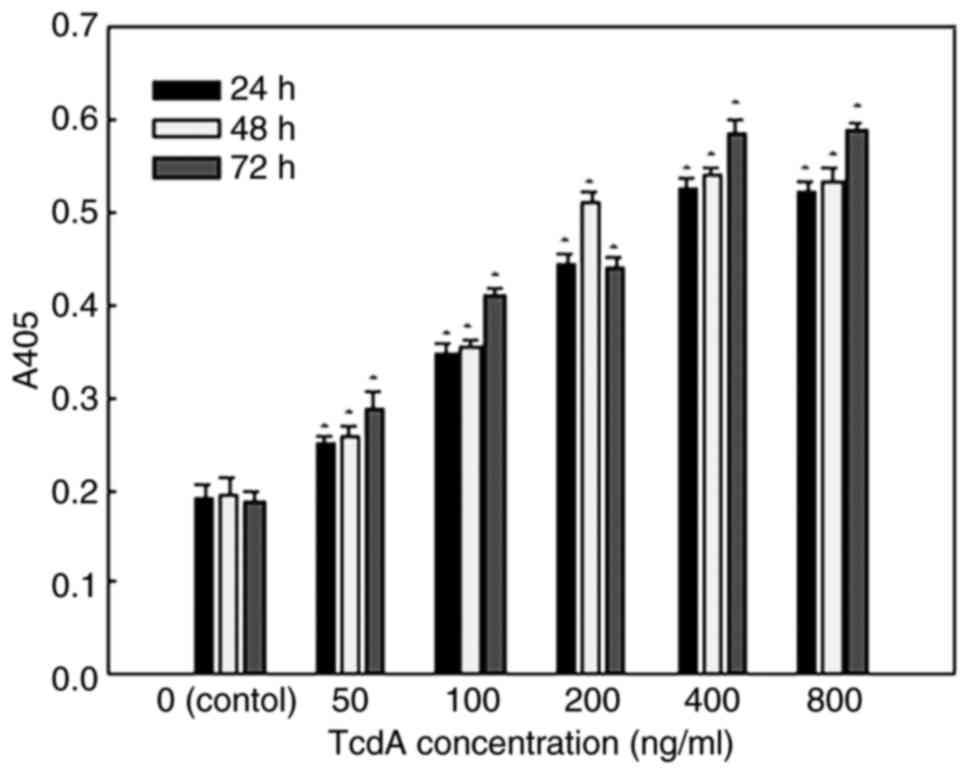|
1
|
Aberuyi N, Rahgozar S and Moafi A: The
role of ATP-binding cassette transporter A2 in childhood acute
lymphoblastic leukemia multidrug resistance. Iran J Ped Hematol
Oncol. 4:118–126. 2014.PubMed/NCBI
|
|
2
|
Gillet JP and Gottesman MM: Mechanisms of
multidrug resistance in cancer. Methods Mol Biol. 596:47–76. 2010.
View Article : Google Scholar : PubMed/NCBI
|
|
3
|
Valera ET, Scrideli CA, Queiroz RG, Mori
BM and Tone LG: Multiple drug resistance protein (MDR-1), multidrug
resistance-related protein (MRP) and lung resistance protein (LRP)
gene expression in childhood acute lymphoblastic leukemia. Sao
Paulo Med J. 122:166–171. 2004. View Article : Google Scholar : PubMed/NCBI
|
|
4
|
Toyoda Y, Hagiya Y, Adachi T, Hoshijima K,
Kuo MT and Ishikawa T: MRP class of human ATP binding cassette
(ABC) transporters: Historical background and new research
directions. Xenobiotica. 38:833–862. 2008. View Article : Google Scholar : PubMed/NCBI
|
|
5
|
Peng Z, Xiao Z, Wang Y, Liu P, Cai Y, Lu
S, Feng W and Han ZC: Reversal of P-glycoprotein-mediated multidrug
resistance with small interference RNA (siRNA) in leukemia cells.
Cancer Gene Ther. 11:707–712. 2004. View Article : Google Scholar : PubMed/NCBI
|
|
6
|
Plasschaert SL, de Bont ES, Boezen M,
vander Kolk DM, Daenen SM, Faber KN, Kamps WA, de Vries EG and
Vellenga E: Expression of multidrug resistance-associated proteins
predicts prognosis in childhood and adult acute lymphoblastic
leukemia. Clin Cancer Res. 11:8661–8668. 2005. View Article : Google Scholar : PubMed/NCBI
|
|
7
|
Swerts K, De Moerloose B, Dhooge C,
Laureys G, Benoit Y and Philippe J: Prognostic significance of
multidrug resistance-related proteins in childhood acute
lymphoblastic leukaemia. Eur J Cancer. 42:295–309. 2006. View Article : Google Scholar : PubMed/NCBI
|
|
8
|
Lyerly DM, Lockwood DE, Richardson SH and
Wilkins TD: Biological activities of toxins A and B of Clostridium
difficile. Infect Immun. 35:1147–1150. 1982.PubMed/NCBI
|
|
9
|
Kamiya S, Reed PJ and Borriello SP:
Purification and characterisation of Clostridium difficile toxin A
by bovine thyroglobulin affinity chromatography and dissociation in
denaturing conditions with or without reduction. J Med Microbiol.
30:69–77. 1989. View Article : Google Scholar : PubMed/NCBI
|
|
10
|
Brito GA, Carneiro-Filho B, Orià RB,
Destura RV, Lima AA and Guerrant RL: Clostridium difficile toxin A
induces intestinal epithelial cell apoptosis and damage: Role of
Gln and Ala-Gln in toxin A effects. Dig Dis Sci. 50:1271–1278.
2005. View Article : Google Scholar : PubMed/NCBI
|
|
11
|
Nottrott S, Schoentaube J, Genth H, Just I
and Gerhard R: Clostridium difficile toxin A-induced apoptosis is
p53-independent but depends on glucosylation of Rho GTPases.
Apoptosis. 12:1443–1453. 2007. View Article : Google Scholar : PubMed/NCBI
|
|
12
|
Mahida YR, Makh S, Hyde S, Gray T and
Borriello SP: Effect of Clostridium difficile toxin A on human
intestinal epithelial cells: Induction of interleukin 8 production
and apoptosis after cell detachment. Gut. 38:337–347. 1996.
View Article : Google Scholar : PubMed/NCBI
|
|
13
|
Brito GA, Fujji J, Carneiro-Filho BA, Lima
AA, Obrig T and Guerrant RL: Mechanism of Clostridium difficile
toxin A-induced apoptosis in T84 cells. J Infect Dis.
186:1438–1447. 2002. View
Article : Google Scholar : PubMed/NCBI
|
|
14
|
Carneiro BA, Fujii J, Brito GA, Alcantara
C, Orià RB, Lima AA, Obrig T and Guerrant RL: Caspase and bid
involvement in Clostridium difficile toxin A-induced apoptosis and
modulation of toxin A effects by glutamine and alanyl-glutamine in
vivo and in vitro. Infect Immun. 74:81–87. 2006. View Article : Google Scholar : PubMed/NCBI
|
|
15
|
Meng XQ, Kamiya S, Yamakawa K, Ogura H and
Nakamura S: Purification and characterisation of intracellular
toxin A of Clostridium difficile. J Med Microbiol. 38:69–73. 1993.
View Article : Google Scholar : PubMed/NCBI
|
|
16
|
Meng QQ, Chen BA, Wu W, Shao ZY, Gao F and
Zhao HH: Antitumor effects of low-frequency ultrasound combined
with adriamycin on human leukemia multidrug resistance cell line
K562/A02. Ai Zheng. 27:1182–1185. 2008.(In Chinese). PubMed/NCBI
|
|
17
|
D'Auria KM, Kolling GL, Donato GM, Warren
CA, Gray MC, Hewlett EL and Papin JA: In vivo physiological and
transcriptional profiling reveals host responses to Clostridium
difficile toxin A and toxin B. Infect Immun. 81:3814–3824. 2013.
View Article : Google Scholar : PubMed/NCBI
|
|
18
|
Wu D, Joyee AG, Nandagopal S, Lopez M, Ma
X, Berry J and Lin F: Effects of Clostridium difficile toxin A and
B on human T lymphocyte migration. Toxins. 5:926–938. 2013.
View Article : Google Scholar : PubMed/NCBI
|
|
19
|
Torres K and Horwitz SB: Mechanisms of
Taxol-induced cell death are concentration dependent. Cancer Res.
58:3620–3626. 1998.PubMed/NCBI
|
|
20
|
Murray AW: Recycling the cell cycle:
Cyclins revisited. Cell. 116:221–234. 2004. View Article : Google Scholar : PubMed/NCBI
|
|
21
|
Thompson CB: Apoptosis in the pathogenesis
and treatment of disease. Science. 267:1456–1462. 1995. View Article : Google Scholar : PubMed/NCBI
|
|
22
|
Pietenpol JA and Stewart ZA: Cell cycle
checkpoint signaling: Cell cycle arrest versus apoptosis.
Toxicology. 182:475–481. 2002. View Article : Google Scholar
|
|
23
|
Zu Y, Yang Z, Tang S, Han Y and Ma J:
Effects of P-glycoprotein and its inhibitors on apoptosis in K562
cells. Molecules. 19:13061–13075. 2014. View Article : Google Scholar : PubMed/NCBI
|
|
24
|
Gibalova L, Seres M, Rusnak A, Ditte P,
Labudova M, Uhrik B, Pastorek J, Sedlak J, Breier A and Sulova Z:
P-glycoprotein depresses cisplatin sensitivity in L1210 cells by
inhibiting cisplatin-induced caspase-3 activation. Toxicol In
Vitro. 26:435–444. 2012. View Article : Google Scholar : PubMed/NCBI
|
|
25
|
Hoshi T, Sasano H, Kato K, Yabuki N, Ohara
S, Konno R, Asaki S, Toyota T, Tateno H and Nagura H:
Immunohistochemistry of Caspase3/CPP32 in human stomach and its
correlation with cell proliferation and apoptosis. Anticancer Res.
18:4347–4353. 1998.PubMed/NCBI
|
|
26
|
Qa'Dan M, Ramsey M, Daniel J, Spyres LM,
Safiejko-Mroczka B, Ortiz-Leduc W and Ballard JD: Clostridium
difficile toxin B activates dual caspase-dependent and
caspase-independent apoptosis in intoxicated cells. Cell Microbiol.
4:425–434. 2002. View Article : Google Scholar : PubMed/NCBI
|















